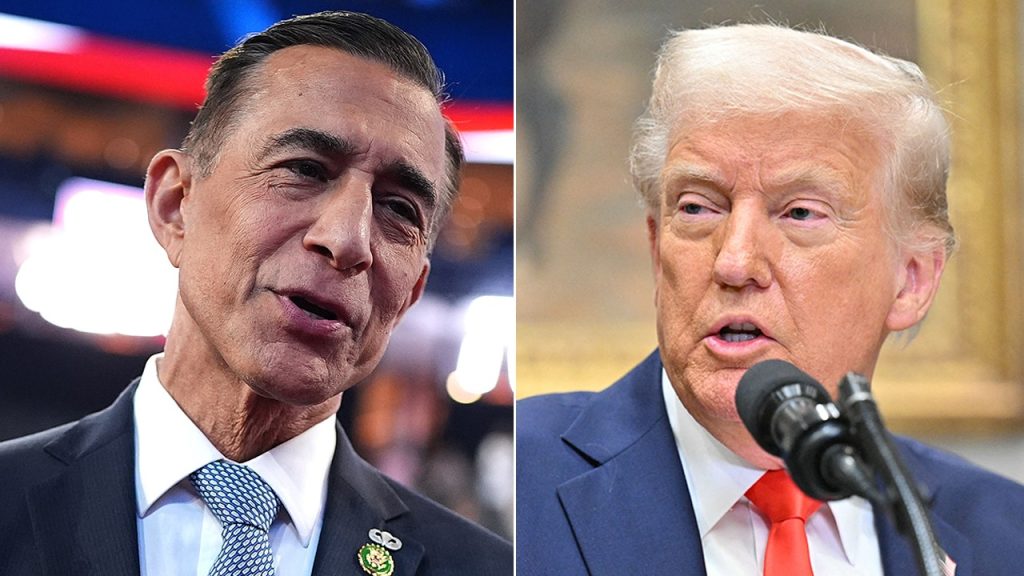On Monday, Representative Darrell Issa, a Republican from California, took to social media and announced his nomination of former President Donald Trump for the prestigious Nobel Peace Prize. Issa, in his emotional declaration, argues that Trump exemplifies the values associated with the award, asserting he has made significant contributions to global peace efforts. The nomination surfaces against the backdrop of other congressional figures who have similarly nominated Trump for the honor in recent years.
| Article Subheadings |
|---|
| 1) Issa’s Public Declaration |
| 2) Justification for the Nomination |
| 3) Previous Nominations and Context |
| 4) Responses from Officials and Media |
| 5) Impact of the Nomination and Future Implications |
Issa’s Public Declaration
In a striking announcement on social media platform X, Representative Darrell Issa made it clear that he has officially nominated Donald Trump for the Nobel Peace Prize. He stated, “Today I will nominate @realDonaldTrump for the Nobel Peace Prize. No one deserves it more.” This declaration not only highlights Issa’s firm belief in Trump’s contributions but also invites attention to the broader implications of such a nomination. The timing of this declaration is significant, occurring amidst a politically charged atmosphere in which nominations for major awards often spark debate and scrutiny.
Justification for the Nomination
Issa elaborated on his reasoning, emphasizing that Trump’s presidency has been marked by a commitment to what he dubs “peace through strength.” He remarked, “Not since Ronald Reagan has an American president better represented the national resolve of peace through strength or the fundamental case for a world without war.” This perspective is rooted in the belief that Trump’s assertive foreign policies have led to a more stable international environment. Issa pointed out that the anticipation surrounding Trump’s potential return to the presidency could foster peace in various regions worldwide and asserted that the Nobel Committee should recognize this potential impactful leadership.
Previous Nominations and Context
This is not the first instance of a Republican lawmaker nominating Donald Trump for the Nobel Peace Prize. Last year, Rep. Claudia Tenney from New York also nominated Trump for the same accolade, attributing this gesture to his pivotal role in establishing new peace agreements in the Middle East. The nomination from Tenney, alongside a nomination she made for Israeli leaders, underscores a growing trend among GOP figures aiming to underscore Trump’s legacies at a crucial juncture in global politics. Tenney further proclaimed, “Donald Trump was instrumental in facilitating the first new peace agreements in the Middle East in almost 30 years,” reinforcing a political narrative often used by Republican supporters of Trump.
Responses from Officials and Media
Trump’s nomination has drawn varying responses among officials, pundits, and the media. While supporters praise the nomination as a recognition of Trump’s contribution to peace efforts, critics have questioned the validity of such assertions, particularly when scrutinizing the complexities of international relations during Trump’s presidency. Responses have been mixed, reflecting the polarized nature of contemporary American politics. Instances of public discourse surrounding this nomination indicate a broader conversation on what qualities and achievements should truly merit the Nobel Peace Prize, with some calling for a more nuanced understanding of global peace efforts.
Impact of the Nomination and Future Implications
The implications of Issa’s announcement are significant as it may influence future political narratives, particularly those surrounding Trump’s potential return in upcoming elections. The act of nominating Trump raises questions about how various political strategies can be framed in the broader context of national and international peace. As the political landscape continues to evolve, such nominations can serve as rallying points for supporters, potentially energizing Trump’s base while simultaneously providing material for opponents to counter. Thus, this nomination may not just remain a solitary event but could resonate into the fabric of future electoral campaigns.
| No. | Key Points |
|---|---|
| 1 | Rep. Darrell Issa nominates Donald Trump for the Nobel Peace Prize via social media. |
| 2 | Issa cites Trump’s leadership style as embodying the concept of “peace through strength.” |
| 3 | Other lawmakers, including Rep. Claudia Tenney, have previously nominated Trump for his role in Middle East peace agreements. |
| 4 | The nomination receives mixed reactions in a politically charged environment. |
| 5 | Future implications of the nomination may influence Trump’s potential candidacy in subsequent elections. |
Summary
The nomination of former President Donald Trump for the Nobel Peace Prize by Representative Darrell Issa underscores the ongoing debate regarding Trump’s impact on international relations. While supporters laud this nomination as a recognition of peace efforts, critics remain skeptical, reflecting the polarized nature of contemporary American politics. As various political figures engage in such nominations, the implications may extend beyond the awards themselves, influencing the narrative surrounding Trump’s legacy and future political aspirations.
Frequently Asked Questions
Question: What are the criteria for the Nobel Peace Prize?
The Nobel Peace Prize is awarded to individuals or organizations that have made significant contributions to peace efforts, conflict resolution, or disarmament.
Question: Can a sitting president be nominated for the Nobel Peace Prize?
Yes, sitting presidents can be nominated for the Nobel Peace Prize, as was the case with former President Barack Obama who received it in 2009.
Question: How does the nomination process for the Nobel Peace Prize work?
The nomination process involves recommendations submitted by qualified individuals or organizations, after which the Nobel Committee evaluates the candidates and makes a decision on the award.



